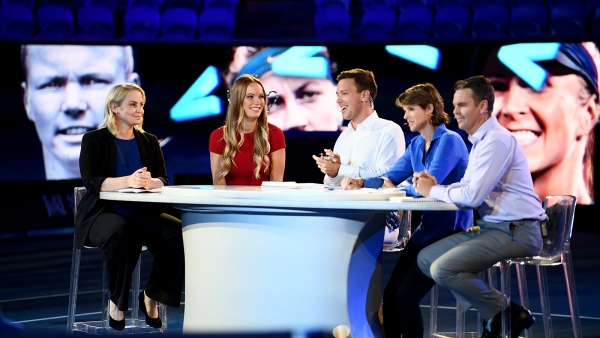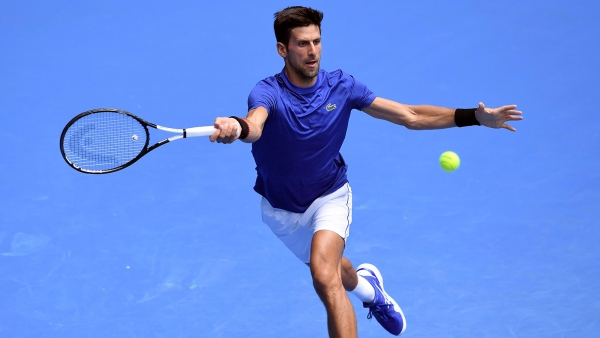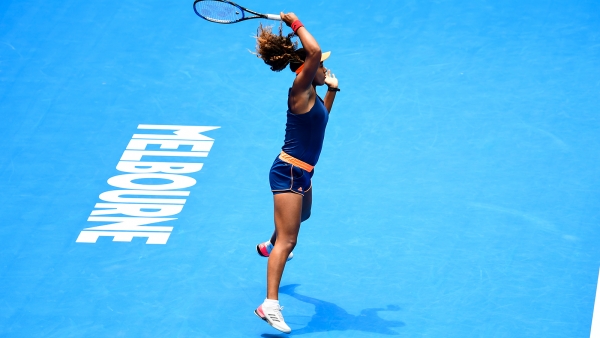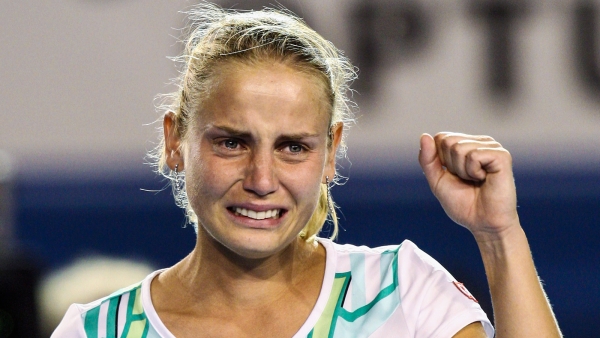Jelena Dokic lives within sight of Melbourne Park.
“I wouldn’t be anywhere else, especially during the Australian Open,” she declares, over a coffee not far from the city apartment she shares with Tin Bikic, her partner of 15 years.
“I just look forward to the whole thing: the buzz, the energy that goes around not just the Australian Open but the city.”
The former world No.4, part of new broadcaster Channel 9’s all-star commentary team, has already called the action in Brisbane and Sydney. But the excitement goes to another level for the Open. Even now in the comms box.
“When I was a player, I always looked forward to it,” says the 35-year-old. “And now, even though I’m on the other side, it’s still good to be a part of it. I get to do my job but also watch matches and hang out.”

Dokic’s history at the Australian Open is worthy of an opera – such dizzying highs and terrible lows. The raw numbers – eight Australian Open campaigns, for an 8-8 record in main draw play – barely hint at the drama.
There was the booing that rained down on a 17-year-old Dokic in 2001, after her father decided to uproot the family and return to Yugoslavia. The infamous denouncement of her first-round conqueror Rita Kuti-Kis in 2000 – also the handiwork of her father. After an absence of four years and back representing Australia in 2005, she was robbed of victory by an overrule on match point, in the bad old days before Hawk-Eye.
You might think the former Australian No.1 has to steel herself against bad memories at Melbourne Park. Not at all.
“I love it. I live here, I spend all my year here,” she says of her favourite Grand Slam.
“Definitely I don’t look at it as: ‘This is what happened and this is what I did.’ For me, it doesn’t work like that. I look at the good and the bad in the same way. That’s my life.
“Some tough times I went through but I don’t look back so much. You have to look forward.”
MORE: King pays tribute to inspirational Dokic
Dokic did not leave tennis at a time of her choosing, a persistent wrist injury effectively ending her career at 29.
“I planned on playing another four or five years” – and she then found enforced retirement tough.
“The adjustment is big after tennis. Getting back into normal life is not easy.”
But she used the time to complete her coaching certificate, work with young players at Melbourne Park, dabble in commentating, and write her searing memoir, Unbreakable, which details the shocking abuse at the hands of her father, Damir, that all-but destroyed her career.

The book has reshaped Dokic’s life and identity.
“It’s changed my life 180 (degrees),” she says. “I wish I could have done it earlier.”
Dokic enjoys the public speaking and connection with others suffering from family violence.
“To be called inspiring and empowering is the biggest win I’ve had in my life,” she said on being named the Most Inspiring Woman of 2018.
“I get to not just tell my story but in a way help other people, who are going through 10 times worse than I did. If I can help a little bit, even make one day better for them, that’s my goal.”
Dokic has also pivoted in quick time into a TV commentator, for which she gives Todd Woodbridge a lot of credit.
“He was a mentor for me in general, after I retired. He’s incredible at his job and yeah, got a lot of encouragement from him.”
As a one-time teen sensation, Dokic is wary of singling out young players and heaping added pressure. She has no words of wisdom for Alex De Minaur, the leading Aussie at 19, and seeded for the first time at his home Slam.
“I don’t think he needs advice. He’s been doing it pretty well. I like the way he goes about things, he works really hard and competes really well.”
Pressed, she names imposing Russian Karen Khachanov, the No.10 seed: “I really like how he’s playing.”
And the flinty No.11 seed Borna Coric: “He’s always been someone to watch.”
But Dokic isn’t convinced this is the major where the millennials break through.
“I still think Federer, Djokovic and Nadal are dominating; that’s the reality. In a semi or final, best-of-five sets, you would still put Djokovic as the favourite.”

Dokic called Ashleigh Barty’s upsets of Simona Halep and Kiki Bertens in her run to the Sydney final and says of the No.1 Aussie: “I love how she plays. I love that she has so much variety in her game and can do anything. It will be a matter of dealing with the big hitters. She doesn’t have a huge weapon but she has a lot of other options.”
It’s 20 years since Dokic made her Australian Open debut as a 15-year-old, bowing to defending champion Martina Hingis in the third round, having just clinched Australia’s first Hopman Cup alongside Mark Philippoussis.
“Personally, for me those were some of the tough times,” she reflects. “I don’t necessarily look at them as unbelievable moments. To me it feels even longer than 20 years ago.”
Though she was a Wimbledon semifinalist in 2000, the happiest tournament of Dokic’s career came at AO2009, with her headline run from wildcard playoff winner to quarterfinalist.

“Every single person who talks to me about tennis, to this day, talks about that Australian Open.”
Ranked 187, Dokic’s opening-round win over Tamira Paszek was her first in a Grand Slam for six years. Her second round against Anna Chakvetadze saw her back in Rod Laver Arena for the first time since the nadir of 2001, and finally, officially, embraced by the Australian public.
“Yeah, it was very emotional and a bit nerve-wracking,” Dokic recalls. “I knew I would get support. I just didn’t think it would be as big as it was.”
In the third round she overcame a talented teenager seeded 11th, Caroline Wozniacki. Every win went the distance, as did her quarterfinal loss to eventual finalist Dinara Safina.
“Look, it was a great memory,” she says. “Pretty incredible experience to be a part of. If there was one result or memory in my career that I would pick, that would be the one.”
But Dokic is more interested in looking ahead.
“I’m really happy with how I’ve settled in general in life,” she says.
These days, the ranking Dokic strives for is a personal happiness index. Where is she on that scale?
“A hundred out of 10.”